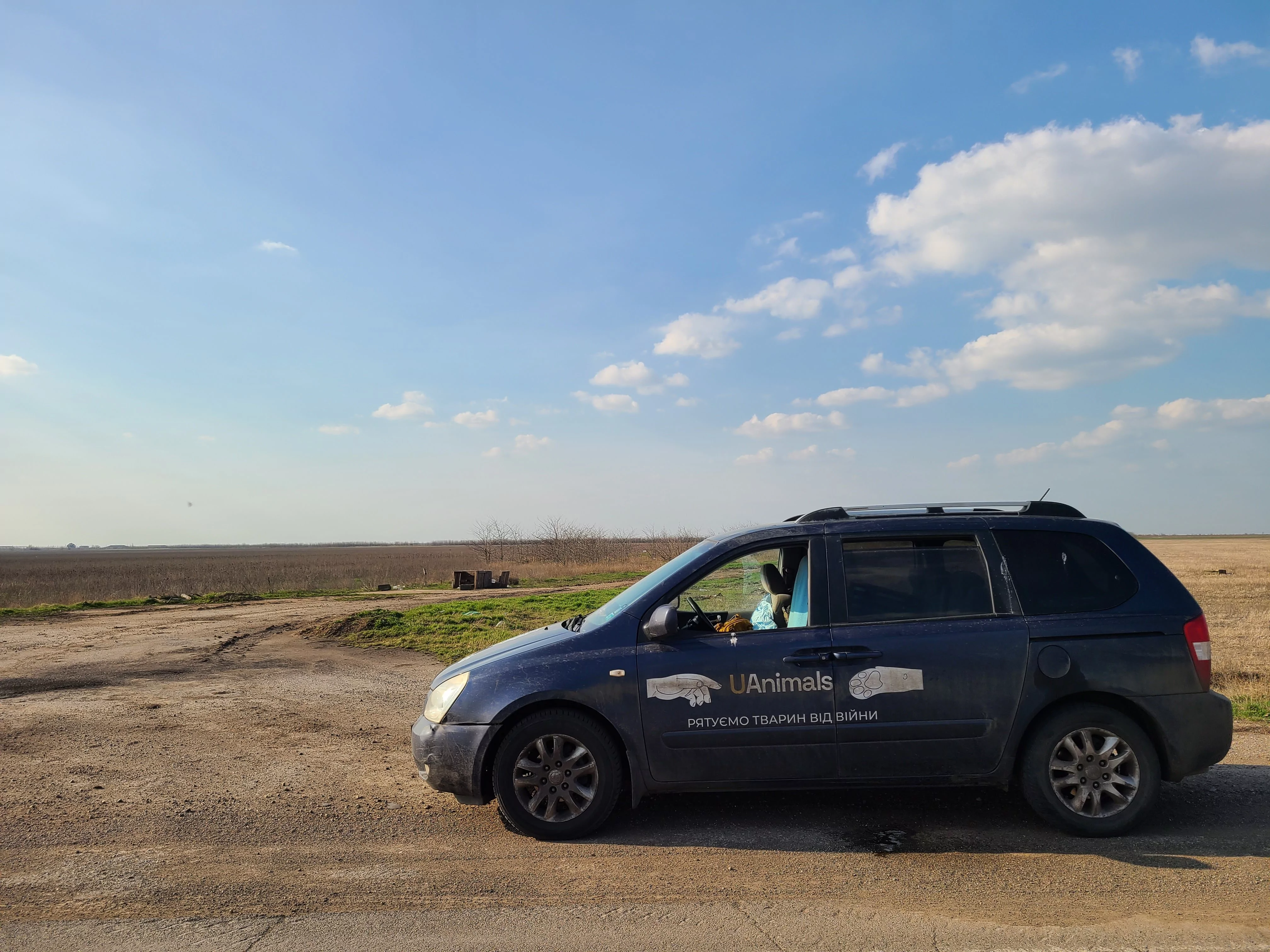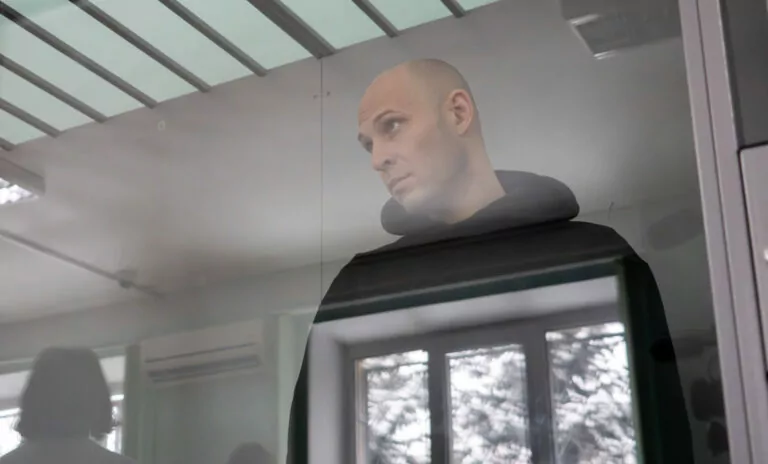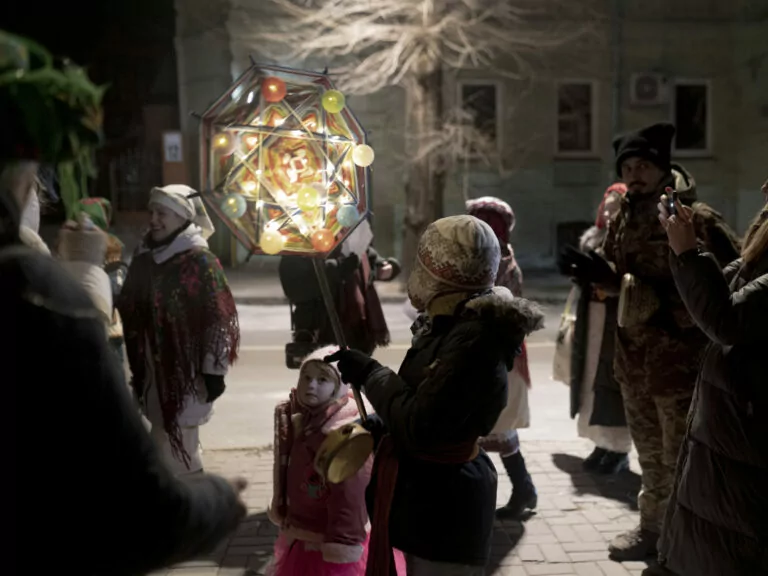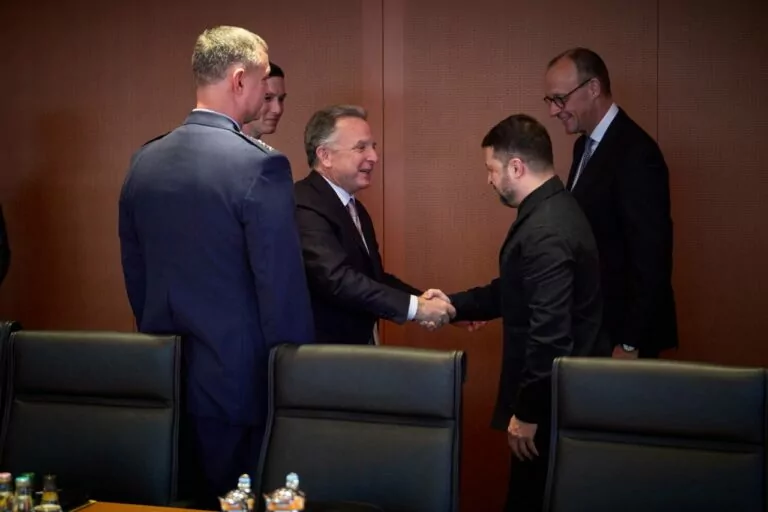“I wake up, do the morning ritual, make myself some coffee, maybe make something to eat, and then prepare myself to teach a couple of lessons. And after the lessons, I generally have some free time when I plan other tasks,” Scott Urquhart says about his routine. It may sound pretty mundane, except this routine takes place not in his native Anniston, Alabama, in the USA, but in the borderline city of Kharkiv in Ukraine, which Scott chose as a temporary residence during the war.
Urquhart came to Ukraine on Nov. 1, 2022, and has recently obtained a temporary residence permit that, according to Scott, challenged him more than battlefield shellings. Now he resides in Kharkiv and divides his time between teaching English to Ukrainians and helping the animals in frontline areas as a UAnimals volunteer.
So speaking about his daily routine, Scott says, “I also clean the van and animal cages and get everything ready for the next mission, which usually comes on Friday. So I’m pretty much still volunteering for UAnimals by doing little things in the city and with myself and teaching and roaming the streets of Kharkiv, seeing if anyone needs some help.”
We talked about Scott’s motivation to stay in Ukraine, his life in Kharkiv, the crucial cultural differences between Ukrainians and Russians, our younger generation, and the future of the whole world.
- The decision to come to Ukraine
- Kharkiv
- Getting visa
- Language barrier
- Visits to Russia
- Animal rescue
- Working with children
- Best moments
- Message to the world about Ukraine
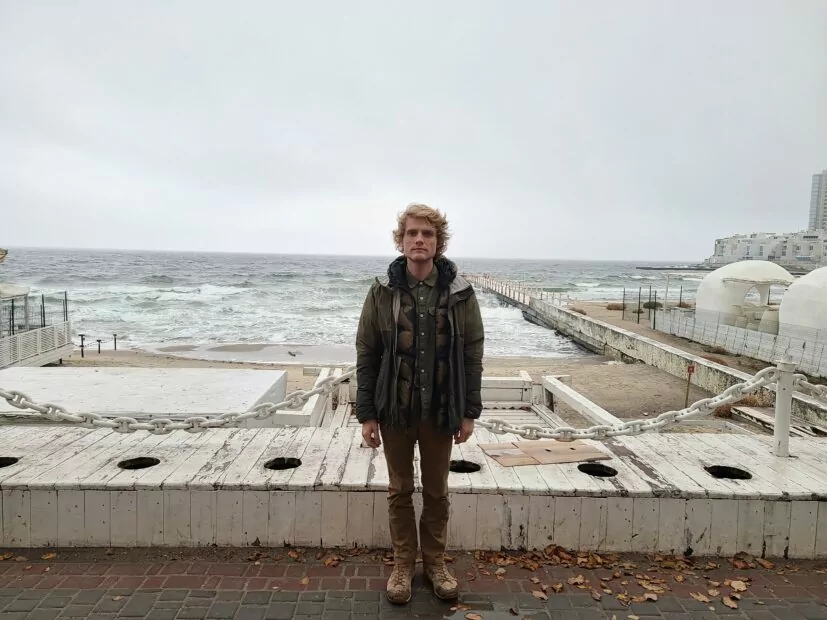
The decision
“The first time I came to Ukraine was in 2016, and I came back in 2017 two more times, and then last year,” starts Scott in our conversation about his Ukrainian life chapter.
-Has Ukraine changed during these years? What have you encountered?
I think I’ve seen more of a push towards the Western alliance, trying to integrate into the European Union, everyone telling me they are Europeans. I find that crucial now. I think it definitely ties in with the war.
Since 2014, I think that the fate of the entire planet has been in Ukraine, beginning with the Maidan Revolution, the start of Ukrainians distancing away from the Russian Federation and fighting for independence. And a stronger sense of wanting to have this autonomy, which is amazing.
My previous visit was isolated to just Kyiv and Odesa. And since I’ve been here for so long, I’ve seen much of the country, pretty much everywhere except for the Carpathians, and the occupied territories. My perception is that things have absolutely gotten better in Ukraine, but they could be a lot better than they are. Even war aside, driving through all these roads and seeing and feeling the corruption behind the car’s wheel. I can understand why people in the eastern regions of Ukraine might feel more compelled to be pro-Russian; they are very impoverished. And it seems that lack of government support has garnished people to have these beliefs. But these people don’t understand that they will be worse off by hearing the propaganda of the Kremlin. I think that once the corruption goes and the government starts to focus on all those neglected regions, there will be more unity within Ukraine. I think that’s a pretty big problem.
Some folks choose to stay in Bahkmut, Avdiivka, etc, etc, waiting to be liberated and freed by the Orcs [meaning Russians – ed.]. They have been inundated with propaganda, though they are Ukrainian, their minds have been stolen by the Kremlin and through feeling neglected by the Ukrainian state. I must also add that many city officials of these regions fled their posts well before the war, and I think that should speak for itself. The Russian mindset of power has no consideration for their citizens, only for their own pockets of greed.
-What was your initial motivation for visiting Ukraine?
I was interested in Eastern European culture then and still am now. I’m living here now because I find it comfortable for myself.
The first time was to experience that specific culture, and the second was because I wanted to learn more about this country, visit its sights, see its people, and talk with them.
-It may be weird to hear the word “comfortable” in a war city context.
I mean, I have everything that I could ever want in my life. First of all, I have all my needs met. I have water. I have electricity. I can live without it, but it makes things a little bit more comfortable. All the basic needs and everything I could want are also here. Just materialistic goods, things of this nature.
Scott says deciding to come to Ukraine during the full-on war was not hard.
I’m comfortable in my life and what I’ve done. I think if something did happen, I wouldn’t care. I mean, I’d be dead, so… (laughs) I have done a lot, and I am okay with doing the things that I do.
However, Scott notices the importance of being ready to face the reality of war.
“Entering into Ukraine during the war, I had to prepare for the events that would take place around me. If you come into Ukraine and you don’t think about hearing air raid sirens all the time, you don’t think about seeing drones in the sky flying over your head and knowing they are gonna land at some kindergarten, these things will be very shocking to you.
I had a student who had not been to Ukraine since the war started, and she returned. She went to Kyiv, heard the air raid siren, and yelled in the street for everyone to be okay, telling them, “It’s okay, it’s okay! It’ll be fine!” No one in Ukraine is doing this because everyone has acclimated or adjusted to these things. So I think it’s very important to condition yourself for the things that you will hear or see, or the things that you might hear or see while entering this country.
There is a lot of sadness. But at the same time, there is a lot of hope, and there are a lot of people having happy moments too.
-How did you decide where to go and find volunteer initiatives?
I came to Ukraine because I have students from this country, and hearing them, listening to their stories, really made me feel that I need to go to Ukraine. And now that I am here, I can’t leave; it feels wrong. When I went to Poland to get my visa, I told myself things were too nice in Poland. Commercial airliners were flying over my head, passengers going on vacation, that things. You know, not rockets or murderous Shahed drones. That was quite nerve-racking for me, as well as having services everywhere I went, having places to sit in or stay or sleep, it was just too nice, too luxurious for me, and I felt bad about leaving behind all of my friends who were in Ukraine, and enduring those difficult conditions of last year and earlier this year, when we had so many power outages, things were very insecure in terms of infrastructure, and it felt wrong to leave that behind.
As soon as I got an understanding of what was happening in Ukraine, I figured out all the volunteering things. I got to stay with one of my students for a month in Lviv, which was really nice, and Lviv is quite far away from the war, although its people are still impacted by what’s happening in their country and city. Things were a little nicer in Lviv than in other places at that time, and I wanted to go to the frontlines to help out. So I reached out to an organization, UAnimals, and asked them. I said, “I’m begging you to let me work with you,” they said, “Okay.”
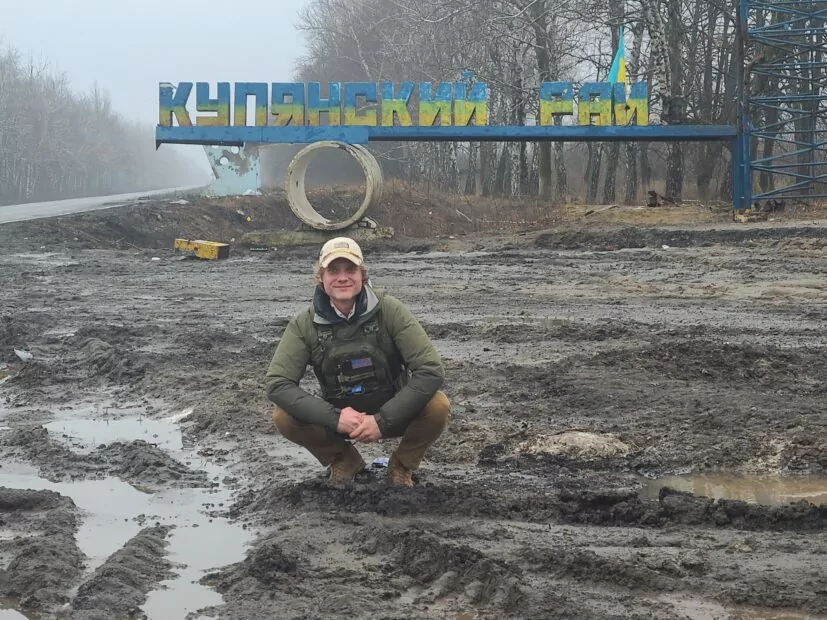
Kharkiv
“One of my students told me about a music producer named Dj Sacred. I listened to his music and said, “Wow, that reminds me of when I was growing up in the southern region of the United States. He focuses on Memphis rap, and I found it incredibly strange, but in a good way, because it’s something very niche; it’s something I don’t think many people know about, let alone some people in Kharkiv. And to hear somebody from a different country test out this music genre and apply it to their vision of music is incredible for me. So I reached out to him and said, “Hey, I’m volunteering in your country. I really enjoy your music. I would really like to meet you and buy you a beer.” He said, “Okay, let’s meet,” I stayed with him for a week and got my own apartment because of everyone he introduced me to and took me around the city with. I understood that I would have a comfortable life here.
Before, I hadn’t been to Kharkiv but had heard about it from several students.”
-Do you have any favorite places in the city?
I’m not the kind of person who likes to go to clubs or bars, I prefer the forest, and the forest here has landmines, so I can’t really go there. In terms of culture, Kharkiv has a really strong music scene, or maybe I’m biased because all my friends are a part of the music scene and the art scene. I stay in Kharkiv because of the people I have met.
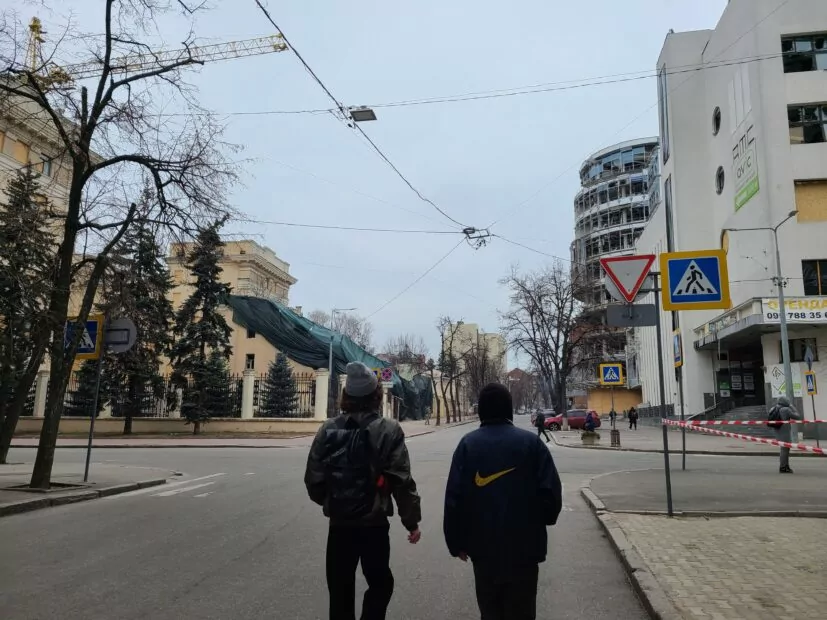
Challenges
“The most difficult part of staying here that long was obtaining my visa, the temporary residence permit. For future volunteers, it would be great if the Ukrainian government made some requirements easier to obtain. Because many of us want to stay here, and many of us do not know how to do what I did or know the right people to stay and help out. Many things in Ukraine need assistance; these can be individuals or organizations like the one I work for. But the further East you get, the more people you encounter who need help, and some of these people don’t know about these organizations at all. And I do know some people who use their money to provide for themselves while volunteering. I have just met an Englishman, and another guy from the United States, who perform medivacs, and they operate independently and rely on their friends and families, who help them help Ukrainians. So I think it would be difficult for them to obtain a visa without an organization that sponsors them. I think that this process can be a lot easier.
It’s about bureaucracy. Not everything is clear to us when we go online, trying to find all kinds of documents we need. I brought everything one time, which was not what they needed, and the website gave an incorrect address, so when I went to the address, they gave me a different address… It’s not very clear for someone trying to do that by themselves, and it’s not very clear for a Ukrainian doing this for the first time for a foreign volunteer.
I cried a couple of times while I was trying to get it (laughs). The frontline – it’s okay, but trying to get this residence card! That was more emotionally painful for me.
I think there is also some residual Soviet mindset regarding foreigners visiting the country, and all these processes are the factors left over from that time. Because when I try to enter any post-Soviet country, it is usually pretty challenging. I can stay for three months, but longer can be a test to obtain. It’s pretty difficult to receive some kind of official documents as a foreigner. I ran into a police officer the other day who asked me for my document for residency, which I didn’t know about until my friend explained to me, that during the Soviet times, you had to register where you were living so the government knew where you were, you had a local office that controlled all of your papers, and the police officer asked if I was a part of that, and I was really confused; “Where does this come from? Do I need this? Am I in trouble ’cause I don’t have this?” I don’t know these things as a foreigner.”
-Have you faced any other difficulties staying in Ukraine during the war?
Only the visa things.
People have always been welcoming to me. Everywhere I go, I have a place to stay, no problems; it’s been great so far.
My friends didn’t help me with my processes at all, they offered, but they didn’t know what they could do, so pretty much everything I’ve done here so far I’ve done independently, aside from the organizations work that they did to have me be a part of their team..
So even if you don’t have any contacts or help, you can still come and find whatever you need.
Languages
“People approach me and ask for food. Or I will ask them if they need any assistance. I don’t experience any overwhelming language barrier problems, even though don’t have the ability to know what anyone has said to me, I just know they need help. I had somebody approach me, asking for food, and it was obvious what they were asking for. I didn’t need to speak the language; that was something I understood.
I’ve learned Russian, and that kinda helps, but I’m replacing it with Ukrainian at the moment; I’ve just started learning. I’ve already been here since November, and I felt it was time to learn, as I’m going to be here for a while longer.
I learn through applications on the phone and a private tutor, which I have had trouble finding. It’s just schedule differences and personality differences. I just need to find the right tutor for me, someone who’s not too serious; I’m just very picky.
Both Russian and Ukrainian are very difficult to learn. One is not more difficult than the other, it’s about the Cyrillic alphabet and different cases, and once you have an understanding of either of those languages, it makes it easier [to learn the other]. But as to my understanding, Ukrainian is closer to Polish, Slovakian, or Belarusian than it is to Russian.”
Visits to Russia
Before the start of the full-scale invasion, Scott had spent some time in Russia. Now he has gotten a new context to reflect on that experience.
“I visited Siberia, not Moscow – I don’t wanna go there,” laughs Scott.
-Was there anything in your experience of that visit that acquired new meaning after the full-scale invasion?
When I was living in Siberia, I had maybe four or five different people tell me, “Scott, I hope not to see you in war; I hope not to see you on the battlefield,” and I was like, “What the hell, where did this come from?” And now, all these years later, I finally say, “Oh, this is interesting.”
They have been feeding their people some little pieces of information over the years regarding war, so I think that they were trying to build up support for the inevitable war they would have.
-Has the war changed your opinion about Russia?
I have always hated nationalism, in any form, from every single country. I think it really further divides people, and that’s not what we need. We don’t have anything (laughs), yet we still fight each other over the stupidest of things or principles or beliefs or whatever it is.
There is a needed change in the mentality of these people, of which, conservative pro-Trump Fox News watchers in America share the exact same Kremlin backed rhetoric, except for the Russians, theirs is much more sinister.
Just as I have lost many family members to their beliefs, I have lost nearly all of whom I had known in Russia. Maybe 4% are actively participating in pro-Ukrainian rallies abroad and donating to Ukraine. In short, my opinion has changed indefinitely. I say all of this while also noting that such loss is negligible compared to the lives of Ukrainians taken by Russian aggression. I am waiting for the inevitable day when Putin is dragged out onto the streets with only his trail of blood backing him. If you know what happened to Ghaddafi, I wish for far worse for Putin.
-And what’s your impression of Ukraine now?
I did not have an understanding of what was taking place in the East or anything regarding the Maidan revolution or what was happening within this country during and before 2014. After being here for many months, I can understand that 1. the world’s destiny is in Ukraine; 2. Ukraine is going to be a prosperous country after the war because I believe in its people and their willingness to defend their own country, and I’ve heard of pretty much everyone I’ve been talking to being sick and tired of this fucking corruption and are just fucking done with it. It needs to go. And everyone I’ve met and know in Kharkiv is very progressive. They fight for the rights of LGBTQ people, the environment, worker’s rights, and they have all these wonderful fundraisers they perform, such as concerts, club shows, and auctioning art pieces. It’s incredible.
I have a strong hope for the future of Ukraine, and I want to be here while it’s being rebuilt.
-You expressed a strong belief that Ukrainian and Russian cultures are very different. In which way?
Ukrainians value their independence and democracy more than the Russian people do. You speak to the common person in Russia, and they will tell you that they need a strong leader to unite them all: like a Tsar. They need a king. Ukrainians say like, “Fuck that; we can govern ourselves!” And this is a huge cultural difference. The number of people who are quite progressive also speaks a lot; people who are progressive have respect for democracy which is self-autonomy and being able to govern yourself without having to be governed by somebody else.
Animal rescue
“There are not enough people and resources to help the animals in Ukraine, especially since the war started. Animals have been displaced for numerous reasons. Some people just fucked up. Some people left their animals. Some people thought that they couldn’t take their animals with them, some people were looking for their animals and couldn’t find them because they had run away because of the sounds of the explosions, or their owners might have been killed. There are many reasons why so many animals are roaming the streets of Ukraine right now. But the predominant one is the Russians and the invasion.
Before this war started, Ukraine did have a problem with wild dogs and cats, probably, as well. I remember reading an article when I first went to Ukraine and learned about how the government, then, created a sterilization and tagging program. So they would tag the dog, give it vaccines, sterilize it, and then release it back on the streets. It’s a good thing to do, and I wish they would enact more of it or help organizations that perform sterilization for these animals so that we can reduce the number of homeless animals on the street.
I volunteered at an animal shelter in Mexico, in the state of Chiapas, for a year. We were rescuing animals from the streets, bringing them to the shelter, taking them to the vets, fixing them up, resocializing them, rehabilitating them, giving them all the love and affection they could ever want, and providing them with a no-kill and no-cage shelter. So that was a very big plot of land on the mountain, the size of a football field. All the dogs could run around all day and night as much as they wanted. They were free to do anything that they desired. And I haven’t seen any shelters like that in Ukraine, but I wish I did.
It is a dream of mine to create this kind of shelter here, where volunteers from Ukraine and abroad stay on sight and give their time and energy to these wonderful creatures.
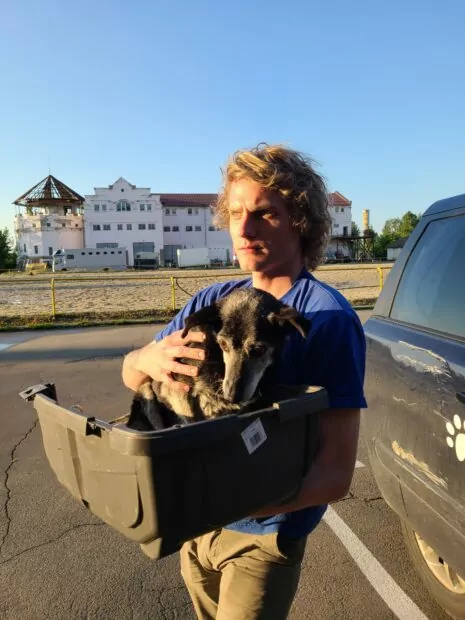
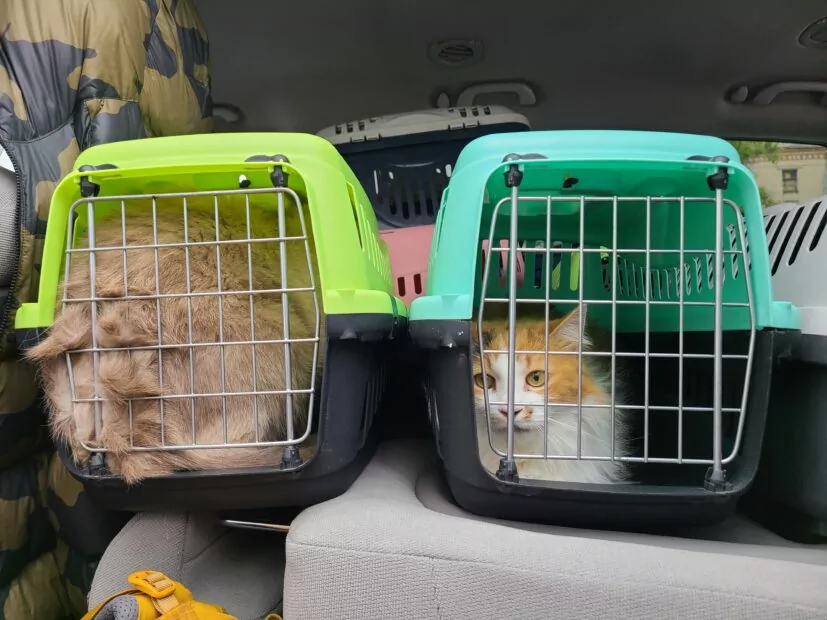
-What can be improved in this field?
It would be better if there could be more adequate facilities to provide a comfortable lifestyle for these animals. Instead of staying inside the building in a cage, they could be walking outside on property protected by a fence, so they can’t escape, and nothing can come in. I think that more shelters like this would be very beneficial, especially for the short term. Because for all people who do what I do, we wish not to see any homeless animals.
-What is the main focus of your work now?
We do have a sterilization van. They perform operations for homeless animals, but we predominantly work on the frontlines because this is where the animals need help the most. We don’t have the resources to help all the animals we encounter on the streets. Unless an animal is in a very severe condition, we don’t help, because the animals we rescue on the frontline endure very violent situations.
Constant artillery, cries of people. I mean, I am talking about rescuing animals, but many people also need help. I do feel some guilt that I can’t help both parties.
Ukrainian children
“I prefer not to teach really young children online because they don’t have the ability to focus; that’s very important. Most people I teach are between 13 and 70 years old,” Scott says about his English teacher work.
-What can you say about the young generation of Ukrainians?
It’s a weird mix between traditional thinkers and progressive thinkers. When I say traditional, I say thoughts of God. Some people are very religious and traditional, so within Ukraine, there are other people who are not aligned with those beliefs. So it’s a good mixture regarding the older population, but most of the young students I have are pretty progressive people. I’d say cool (smiles).
They are not so much different from American teenagers.
It’s comfortable for me here cause things are very familiar. I don’t feel that I’m in a different country. Obviously, the language is different, the alphabet’s different, and the food is different, but I still feel that I can share myself with other people and be accepted. We have the same sense of humor; we listen to the same music, we watch the same movies, and we might read the same books.
-Do you feel the war context influences the kids?
I was teaching children in Ukraine who were much younger in person rather than online. The kids were talking about war quite often, and that’s not something I want them to stop talking about, as I think this is important, and they need to express that if they have any concerns. We can’t ignore what’s happening, and we can’t paint it in a pretty picture. We can’t tell the kids that the fire’s not happening. You should be honest with them and let them know what’s actually going on. My students would feel compelled by the things they’ve heard at night or how they want to go to a different country because the night scares them—hearing all these explosions or even a car that sounds like a Shahed drone. It definitely impacts them, and I’ve thought a lot about this.
There is going to be a lot of trauma within this country. And that’s something that will have to be addressed, especially for the younger people growing up in really devastating conditions.
I think that Ukraine should start to think about how they are going to handle all these people with all the mental stress or triggers that they might face later on when they hear the old Zhiguli start-up and it sounds like a Shahed drone or they hear a lawn mower, or they hear fireworks go off. These are some things that could remind them of the war, and that’s very important to bring them into consideration.
And not just the children, but all of us have experienced this, and I think that Ukrainian people have experienced enough trauma in their lives. So I hope this is it, and after this war, it will be a long time for peace.
Best moments
“All of the little moments that I’ve spent with my friends. Each time I hang out with them at night is a very special time for me. It’s very personal because of the people that I’ve met here. I can share my emotions, thoughts, concerns, and feelings, and I really can be vulnerable with them.
The last time I was extremely happy was when I finally got my temporary residence card. It was just a moment of, “Yes! I can stay here!” (smiles) Just knowing that I can stay here, continue to spend time with my friends, continue to meet people, and help out wherever I can. My reaction is emotional because I can stay and help out longer than I thought I could, which is very important for me.
I see so many things that are really fucked up and devastating on the frontlines, and every single day I want to cry, but I can’t. The tears just don’t come out of my eyes.
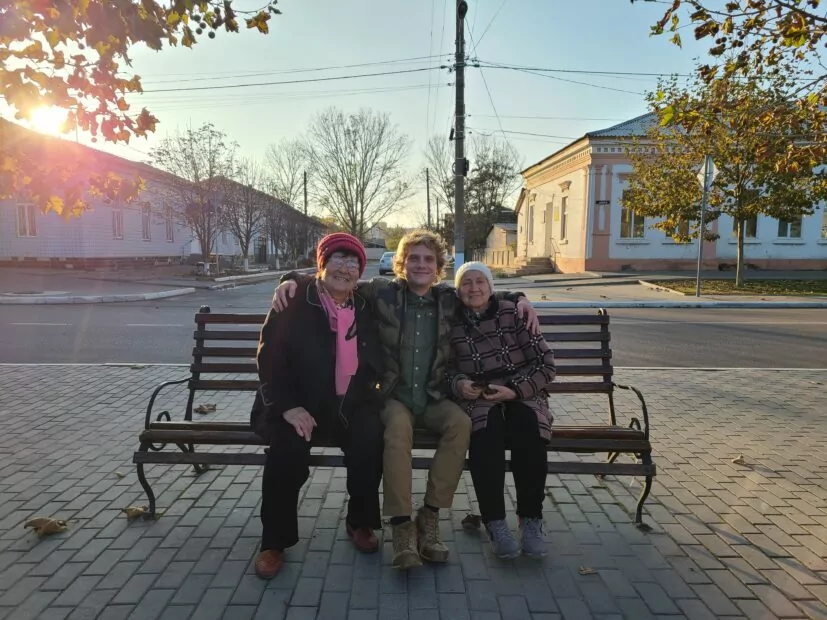
A message to the world
Come to Ukraine. Find a city. Speak to people. Learn what needs to be helped with and who you can assist.
“There is a shortage of people who can help. I don’t think that there could ever be enough people to become volunteers. The more people we have in Ukraine that are helping, the better.
I know that foreign volunteers bring hope to the Ukrainians because they understand and see that the world is here with them and that they have international support and can shake hands with them. You can walk down the street and meet someone from Belgium who is here to try to figure out what’s going on, and they might be assisting with a school or doing something with this or that, and it’s really cool to see. I know that I love it when I see other foreigners here. Especially foreigners who are my compatriots, other Americans, it inspires me. I have met many other foreigners from Spain, Belgium, Argentina. There is another American at the school that I was working with, and I met an Englishman and American volunteer when I was in Kherson. So not too often, but I hear English speakers occasionally. But I don’t meet them every time I hear them speak, because I don’t really love people that much (smiles). Some people are really cool.”
Scott wants to stay in Ukraine and see “it being rebuilt.” “Ukrainians can’t leave their country. Why should I,” he notes. However, Scott doesn’t rule out the probability of relocation to the other Ukrainian city.
“Maybe I will live in Crimea. As a part of Ukraine, after it’s deoccupied. It should be nice.”
Read more:
- Edward Cooney from Canada: “We need to show that we care”
- Brian Dooley: “When I am asked about some hopeful signs for Ukraine, Kharkiv is always one of them”
- Sylvia from Austria: “The best moments are when you see you can make a change”
Follow us on Twitter, Instagram and LinkedIn for more news, stories, and field reports by Kharkiv journalists.
